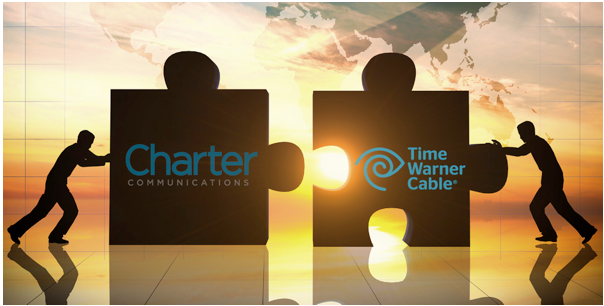CommentsCABLE WARS-The maligned merger between Charter Communications, Time Warner Cable, and Bright House Networks is complete, which means the three companies have now become the country's second-largest cable provider, despite months of warnings from consumer and open internet advocates who assailed it as the creation of a 'price-gouging' monster.
Charter ultimately paid $55 million to purchase Time Warner Cable and $10.4 billion for Bright House Networks. The Federal Communications Commission (FCC) and the U.S. Department of Justice (DOJ) approved the acquisition earlier this month with several caveats -- including a ban on data caps and TV exclusivity deals that would harm competition -- but opponents warn that the deal is still bad news.
"[T]here is some solace that, if rigorously enforced, these conditions should eliminate the more egregious harms this merger could cause while creating a baseline for acceptable industry behavior," Public Knowledge senior staff attorney John Bergmayer said at the time.
However, he added, "It is hard to cheer for further media and broadband consolidation, regardless of what conditions the FCC or DOJ might adopt."
What does the merger mean for the average consumer? As Tim Karr, senior director of strategy at the advocacy group Free Press, wrote in a blog post earlier this month, "Charter will need to hike prices to pay down the nearly $27 billion in new debt it took on to complete its merger. That’s a burden that amounts to more than $1,000 per average Charter customer."
Free Press president Craig Aaron also previously warned that the merger, which he called "wasteful and costly," undermines FCC chairman Tom Wheeler's "oft-stated priority of competition, competition, competition."
"It hands far too much control over the internet's future to a cable giant with the incentive and capability to gouge its customers with higher and higher prices," Aaron said. "It gives cable monopolists like Charter and Comcast the power to throttle the nation's burgeoning video market and stifle innovation at the edges of the network."
(Nadia Prupis writes for Common Dreams where this report was posted earlier.) Photo: AP. Prepped for CityWatch by Linda Abrams.
Sidebar
Our mission is to promote and facilitate civic engagement and neighborhood empowerment, and to hold area government and its politicians accountable.

 CityWatch Los Angeles
Politics. Perspective. Participation.
CityWatch Los Angeles
Politics. Perspective. Participation.
28
Sat, Feb














